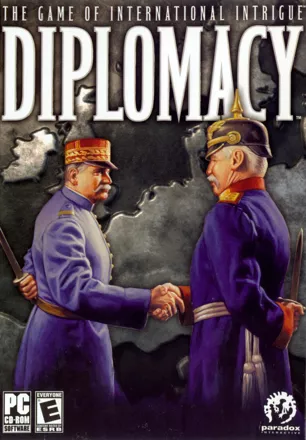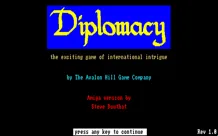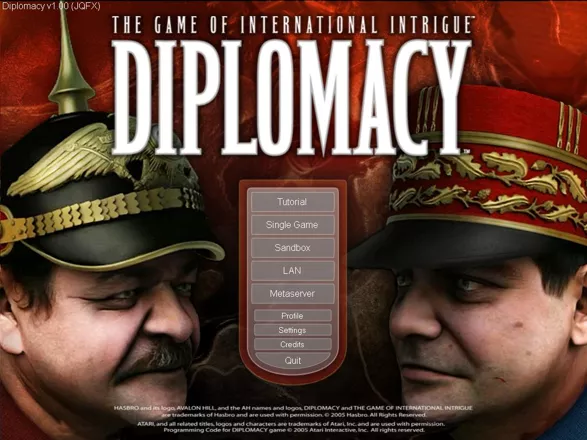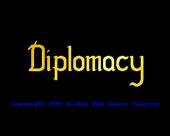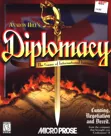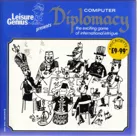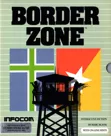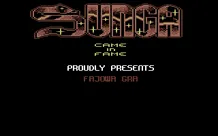Diplomacy
Description official descriptions
Diplomacy is the third game based on Avalon Hill's board game of the same name, where the objective is to conquer the known world (Europe and the Middle East) through diplomacy and war before the other opponents.
Turned-based gameplay occurs on the political map of Europe and the Middle East in Spring 1901. The player may choose one of the 7 (seven) major powers: Austria, England, France, Germany, Italy, Russia, or Turkey, and compete against human or AI opponents.
During each turn, the player may choose to move units (either infantry or naval units) into enemy territory in order to occupy them. As only one military type is allowed per province, offensive and defensive maneuvers requires support from adjacent friendly units or acquiring backup support from adjacent units from other nations through diplomacy. Even more so as a one-against-one military unit will end in a stalemate (or a win for the defensive team).
Certain provinces are more important than other provinces, indicated by a star on the province. These signify supply depots which help maintain military units. The more supply depots the player controls, the more military units the player may build during the build phase.
Diplomatic endeavours themselves may be proposed by the player or other players, consisting of (among others) support units (for offensive or defense), transportation of infantry by naval units (convoy), alliances and DMZ (De-Militarized Zone) agreements. This is done so by selecting a target player and creating a "draft proposal" on the political map by, for example, moving own or units of the target player. This draft is then suggested to the target player for reply. If accepted, both (or more) players may choose to honor the agreement to be carried out the following turn. There is however, no obligation to accept, to honor any form of agreement, as backstabbing is considered part of diplomacy.
Spellings
- Дипломатия - Russian spelling
Groups +
Screenshots
Credits (Windows version)
38 People (20 developers, 18 thanks) · View all
| CEO | |
| Producer | |
| Game Designer | |
| Lead Programmer | |
| Programming | |
| Additional Programming | |
| Lead Artist | |
| 3D Artist | |
| 2D Artist | |
| Tutorial | |
| Lead Tester | |
| [ full credits ] | |
Reviews
Critics
Average score: 62% (based on 24 ratings)
Players
Average score: 3.0 out of 5 (based on 5 ratings with 1 reviews)
[v1.0] A great game of diplomacy without diplomacy for IQ's of 70 and less.
The Good
Review Version: v1.0
Game Version: v1.0.0.1
Tech Specs Used: Intel Dual Core 2 1.86 Ghz Processor, 1GB Memory, 256MB NVIDIA 7300 LE Video Card.
Difficulty Setting Used: Hard.
Factions Played: England and Austria.
Finished: Yes. September, 2008.
Heh. I read the advertising blurb on Paradox's website that says and I quote: "Easy to play, difficult to master." Hahaha. Gawd, if this game is difficult to master, one should really try getting a life. As far as strategy games have come to the PC platform, maybe some board games should stick to just being...board games.
Since, I probably only have a couple of lines to actually say about "the good" of the game, I'd might as well fill in this part about the gameplay, so you'll know how crappy the game is.
Diplomacy is a board game consisting of 7 players (no more, no less) of the “historically incorrect" 7 major powers in the year 1901: Austria, England, France, Germany, Italy, Russia, and Turkey (someone forgot about Spain and several other countries). Well, from this point, you may well sense the original board game is somewhat limited. Not so. It is in fact a complicated form of checkers. :p
Really. Units can only move once to an adjacent province. There are 2 types of units. Land (infantry) and naval units. Land units can go to any land tile but not to sea tiles. Naval units may go to any coastal tile and sea tiles. Also, land units need naval units to move across seas.
The purpose of the game is obvious annihilation of the other parties. However, on the political map, the actual purpose is to control provinces (land tiles) that have a supply depot symbol on it. The supply depot represents how many units your country may support. If you have 3 supply depots, this means you can only support 3 combined units of either land or naval units. Gaining more means you can support more units, while consequently reducing the military size of the opponents.
At a certain time (the end of each turn I think...don't really remember), you may upgrade your military equivalent to the number of supply depots you control...additionally, players who find themselves with less supply depots must disband excess military units. Unit reinforcement however, may only occur at primary supply depots, which are the supply depots you begin with. This means, you can’t reinforce in other provinces nor can you reinforce if that province is inhabited by one of your units (see ground rule, below).
The is a ground rule in the game. Only one unit may occupy a tile at any given time…which to an extent does add some form of strategy difficulty. Units may also “support” attacking or defending units. Increasing their strength. For example one unit attacking a province with another unit already in place, will end in a stalemate. If you have a unit adjacent to the target province, you may use that unit to support the attack. Thus, it’s 2 versus 1. Simple math. A stalemate means nothing changes, which means in favor of the defender. If 2 opponents attack an empty province, with equal military strength, they both retreat and the province remains empty and unscathed.
Now what is “supposed” to make this game more than just “checkers,” is the diplomacy factor. With diplomacy, you can negotiate with other players to establish alliances against another player…either to attack another province or a certain guarantee that your provinces aren’t suddenly attacked without diplomatic consequence.
And that’s it about gameplay. Actually it’s quite easy to grasp in no time at all. The tutorial however, makes it more complicated than it actually is. But before I blow this ship out of water, there is particularly good thing about the game:
Music
The background music in this game is of epic proportions…as it is indeed epic in theme. Something you’d probably want to hear in epic games like Oblivion (where the music to my opinion is disastrously lacking), the music in this game is…how do I say it…overqualified for this game and its quite sad that it will probably remain unheard to the majority of gamers…nor will it be recognized as a musical masterpiece in games.
So, to whoever wrote the fine music for this game. You got one hell of a talent, but really poor taste in game projects. Really, the music in this game is too good just for a “to pay the bills" excuse.
Additional note. The graphics department for the political map did their job perfectly. The bloke who created the graphics for the avatars...did not.
The Bad
Here we go. Lights...music...trash!
A Game where Diplomacy is Garbage
Diplomacy, as the title suggests is probably supposed to be about diplomacy. Now the original board game will probably be fun as the opponent is most obviously human with the standard fun backstabbing, nagging, lies, flirtations, begging and other forms of interesting diplomacy involved. In a computer game, well you don't have that, you're stuck with computer AI...which is pretty lousy no matter how good the AI is.
Diplomacy in actual game play, however, is amazingly optional. You can win the game without using any form of diplomacy whatsoever, which I have done several times. The problem is that diplomacy is difficulty annoying. As usually found in the majority of any strategy game with diplomacy involved, its very much difficult to get the AI to agree with any proposition you have. An alliance for example. They will most likely reject it, so the only way to get an alliance (which by the way doesn’t have any benefits) is to wait for them to propose it to you.
There oddly isn’t many “text” information within the game (the tutorial whoever likes to chatter its mouth too much), so those symbols don’t make sense for quite a while. I had trouble figuring out whether I had an alliance or a non-aggression pact…or was it a peace symbol. We’re not even talking about educational value; in-game help (you know those little pop-up texts that tells you what you’re pointing at) doesn’t even exist. An obvious good game for people who can’t read squat or aren’t smart enough to even bother.
Geographical Imbalance
This isn’t the game developers fault, it’s an overlooked fault from the board game. Certain nations are easier to play than the others. It’s due to geographical positioning. Any country located in the middle of the map, will have trouble defending. France, Germany and most difficult, Austria. Other countries are situated at the map corners or with certain geographical barriers (like the sea, or non-important provinces without a supply depot), thus that country may focus its military units on other fronts without watching its backside.
Dubious Sound Specialist
And now, introducing the worst feature in the game.
The first person that should be sacked in the game is the bloke who made the sound effects for the AI. Am I being too harsh or over dramatic? No, really. I'll tell you why. At the end of each turn, you'll see the movements of the other opponents. And judging if they like or dislike a maneuver from an opponent, they will give an audible response.
These are the responses (among others):
Well, the last is obviously not there. But see the first three. If this is what you'd expect from a "strategy" game in the 21st century, then it's really true…people really do get more stupid with the next coming generation. Why they even had to have this feature in the first place is beyond any philosophical reasoning I can muster.
Even more irritating, they have to make that sound for every unit move. At a certain point, it sounds like a really, really, cheap porn flick you regret having set your eyes and ears upon. Which somewhat makes you wonder what the developers may be doing for additional income. Hmm. Aaah. Ugh.
Come to think of it, I take back what I said about who should be fired. The bloke who approved and supervised the sound effects should be the idiot who gets fired first. I mean seriously, do you actually take pride in the games you create...?
The Bottom Line
So how do you think I feel about the game thus far?
You guessed right.
Windows · by Indra was here (20735) · 2008
Trivia
Awards
- GameSpy
- 2005 – Coaster of the Year (PC)
Analytics
Identifiers +
Contribute
Are you familiar with this game? Help document and preserve this entry in video game history! If your contribution is approved, you will earn points and be credited as a contributor.
Contributors to this Entry
Game added by Indra was here.
Additional contributors: destruent, jean-louis, Patrick Bregger, katarn_88.
Game added September 26, 2008. Last modified July 30, 2024.


